-
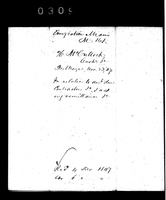 Letter from Hugh McCulloch to William Medill, November 23 1847
Letter from Hugh McCulloch to William Medill, November 23 1847 Now that the removal contract has been fulfilled, McCulloch asks the department to remit the payment to the bank in Fort Wayne as quickly as possible.
-
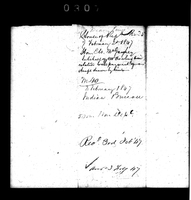 Letter from E. W. McGaughey to William Medill, February 20 1847
Letter from E. W. McGaughey to William Medill, February 20 1847 McGaughey is in the House of Representatives, writing on behalf of former contract owner Dowling, supporting Dowling in an apparent disagreement with the next owner of the contract, Peebles, regarding a $6000 draft.
-
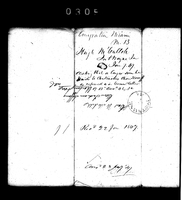 Letter from Hugh McCulloch to William Medill, January 7 1847
Letter from Hugh McCulloch to William Medill, January 7 1847 McCulloch represents the Bank of Indiana. He asks that the Indian Department pay the contractors more than the $35,000 that the Department plans to pay them. The contractors still need to re-pay $15,000 to Peebles and the year-long subsistence rations to the Miamis in Kansas.
-
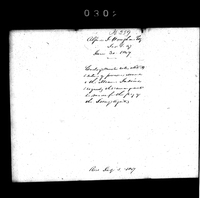 Letter and enclosure from Alfred J. Vaughan to William Medill, June 30 1847
Letter and enclosure from Alfred J. Vaughan to William Medill, June 30 1847 Alfred Vaughan requests payment for his son Leonidas as the commissary who issued rations to Miamis in spring 1847. Included is the list of Miami families.
-
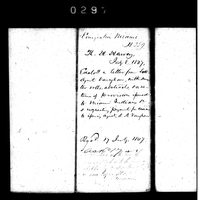 Letter and enclosure from Thomas Harvey to Willam Medill, July 8 1847
Letter and enclosure from Thomas Harvey to Willam Medill, July 8 1847 Harvey encloses a list of Myaamia heads of families provided by sub-agent Vaughan. Vaughan's list includes how many men, women, and children were in each Miami family.
-
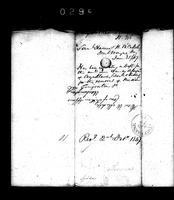 Letter from Samuel Hannah and Hugh McCulloch to William Medill, January 25 1847
Letter from Samuel Hannah and Hugh McCulloch to William Medill, January 25 1847 Hannah and McCulloch ask for the money meant for them as the attorneys and beneficiaries of Coquillard, Edsall and Ewing.
-
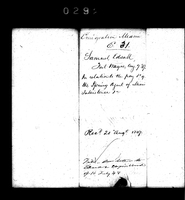 Letter from Samuel Edsall to William Medill, August 9 1847
Letter from Samuel Edsall to William Medill, August 9 1847
-
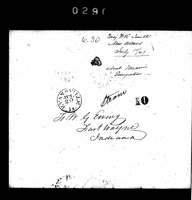 OIA-418-Object-90
OIA-418-Object-90
-
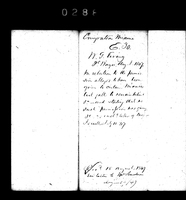 Letter from W.G. Ewing to William Medill, August 8 1847
Letter from W.G. Ewing to William Medill, August 8 1847 Ewing mentions that Major Jouett wrote a letter to Medill that no Miamis were permitted to remain behind during the removal in order to gather their crops.
-
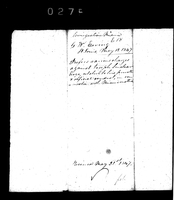 Letter from W.G. Ewing to William Medill, May 19 1847
Letter from W.G. Ewing to William Medill, May 19 1847 Ewing accuses Sinclear of working for a group of "new claimants" who apparently have claims on Miami debts. While employed as sub-contractor of removal, Sinclear apparently went to Washington to get those claims approved, and was promised a cut. Ewing goes on the argue that payments must be organized so that his firm can receive debts owed to them. He complains that the Indian trade business is not very profitable.
-
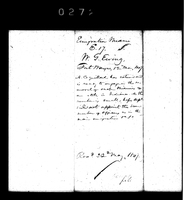 W.G. Ewing to William Medill, May 12 1847
W.G. Ewing to William Medill, May 12 1847 Coquillard has returned following the 1846 removal; he is ready to remove those who did dnot go on the first emigration. Coquillard's wife will go in support. Those who need to be removed are the families of Koassee, White Loon, Me-se-quah, and Revarre.
-
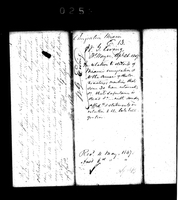 Letter and enclosures from W.G. Ewing to William Medill, April 26 1847
Letter and enclosures from W.G. Ewing to William Medill, April 26 1847 Ewing seeks to defend himself and fellow contractors. In particular, he asserts that the contractors did not allow any Miamis to remain in Indiana except those permitted by treaty and that they did due diligence to find all who must migrate. He includes several affidavits to that effect.
-
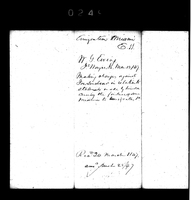 Letter from W.G. Ewing to William Medill, March 13 1847
Letter from W.G. Ewing to William Medill, March 13 1847 Ewing is asserting that he did all he could to fulfill the contract. The context appears to be that they did not deport all Miamis, particularly those who may be Weas or intermarried among Potawatomis on the upper Tippecanoe River.
-
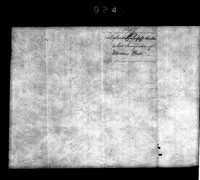 OIA-418-Object-84
OIA-418-Object-84
-
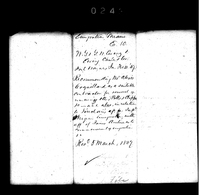 W.G. and G.W. Ewing to William Medill, February 22 1847
W.G. and G.W. Ewing to William Medill, February 22 1847 Suggesting and promoting (by his request) Alexis Coquillard as contract agent to remove Potawatomi, Ottawa, and Ojibwe from Indiana per the 1833 Chicago Treaty, and offering to support him.financially. In a N.B. they
-
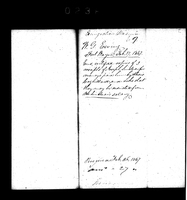 W.G. Ewing to the War Department, February 17 1847
W.G. Ewing to the War Department, February 17 1847 Submits certified copies of receipts that Ewing argues should be deducted from Sinclear's salary.
-
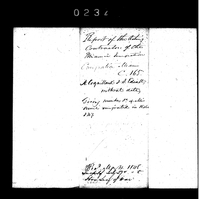 Letter of Alexis Coquillard and Samuel Edsall to William Medill?, n.d.
Letter of Alexis Coquillard and Samuel Edsall to William Medill?, n.d. Summarizing that they removed 328 Miamis in 1846 and another group in 1847, thus completing their contract including feeding them for a year in Kansas.
-
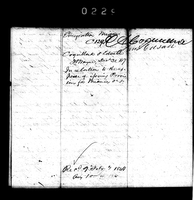 Letter of Alexis Coquillard and Samuel Edsall to William Medill, December 30 1847
Letter of Alexis Coquillard and Samuel Edsall to William Medill, December 30 1847 The two contractors lay out an apparent scheme by Osage sub-agent Vaughan to fleece them by employing Vaughan's son and issuing too many rations, thus forcing the contractors to pay his son for the work.
-
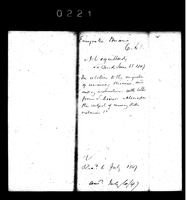 Letter packet re: Alexis Coquillard, June 25 1847
Letter packet re: Alexis Coquillard, June 25 1847 Coquillard offers to remove Potawatomis associated with Miamis for more than the suggested $25/person; he is the cheapest removal contractor he knows of. Miamis are returning from the West under, he thinks, the help of traders Bartlett, Avaline, and Miller. Included in this packet is a scathing letter from a person named Driver accusing Coquillard of spreading a rumor that he brought Miamis back from Kansas to Indiana, and a letter from the Indian Department sticking to its offer of $25/ Potawatomi person removed.
-
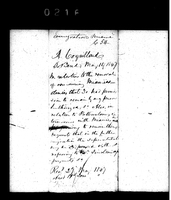 Letter from Alexis Coquillard to William Medill?, May 18 1847
Letter from Alexis Coquillard to William Medill?, May 18 1847 Coquillard says that the 30 or so "Indians" who remained to harvest corn, but were supposed to migrate, were not authorized to remain in Indiana. He offers to migrate families who are Miami-Potawatomi for a fee. He suggests the proper time Sinclear was acting as emigration superintendent, weighing in on the dispute regarding Sinclear's salary.
-
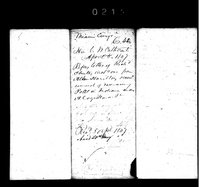 Letter and enclosure from Richard Chute to Charles Cathcart, February 23 1847
Letter and enclosure from Richard Chute to Charles Cathcart, February 23 1847 Allen Hamilton suggests that if the government wants to remove all the Potawatomis from Indiana, that Alexis Coquillard would do it with kindness.
-
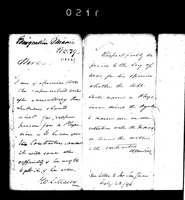 Correspondence re: selecting and paying a physician, undated 1846
Correspondence re: selecting and paying a physician, undated 1846 Notes responding to Sinclear's letter of February 1846 regarding the physician, suggesting that Sinclear should ask the Miamis to help him select a physician. Includes quotes from the contract relating to payment of the superintendent.
-
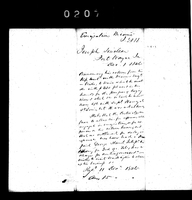 Letter from Joseph Sinclear to William Medill, December 1 1846
Letter from Joseph Sinclear to William Medill, December 1 1846 Sinclear has money for steel and iron and wants to return it. The contractors refuse to pay him expenses on the removal. Sinclear has paid George Hunt, interpreter.
-
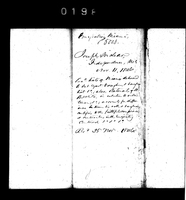 Letter and enclosures from Joseph Sinclear to William Medill, November 11 1846
Letter and enclosures from Joseph Sinclear to William Medill, November 11 1846 Sinclear forwards letters (certified) demonstrating that the ponies have arrived, that several ponies were weak and died or were sold, and that the contractors provided enough food for the Miamis en route.
-
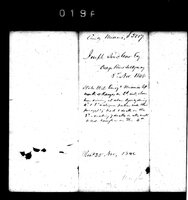 Letter from Joseph Sinclear to William Medill, November 5 1846
Letter from Joseph Sinclear to William Medill, November 5 1846 Reports that the Miamis are arriving on ponies on the reservation. A boy died, bringing total deaths to seven.
-
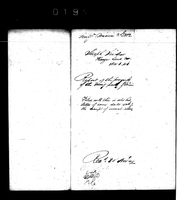 Letter from Joseph Sinclear to William Medill, November 1 1846
Letter from Joseph Sinclear to William Medill, November 1 1846 From Kanzas Landing, Mo. He is recording his receipt of various letters and preparing to turn over the Miamis to Agent Vaughan.
-
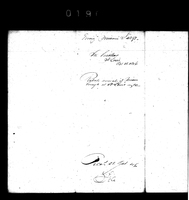 Letter of Joseph Sinclear to William Medill, October 21 1846
Letter of Joseph Sinclear to William Medill, October 21 1846 The group has arrived at St. Louis. He reports the death of two Miamis.
-
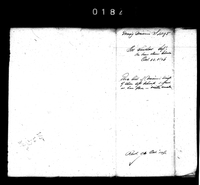 Letter from Joseph Sinclear to William Medill, October 14 1846
Letter from Joseph Sinclear to William Medill, October 14 1846 Sinclear encloses a list of Miamis on board the Steamer Colorado. Ezekiel French has been hired to capture fugitives, who may move West with Potawatomis. Sinclear and Jouett also say they promised to attempt to help creditors get annuity money in Kansas.
-
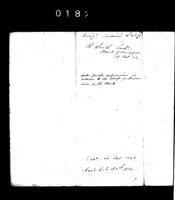 Letter from Richard Smith to William Medill, October 19 1846
Letter from Richard Smith to William Medill, October 19 1846 The board of the Bank of the Metropolis wants assurance that it will be paid $6000 once the Miamis arrive in Kansas.
-
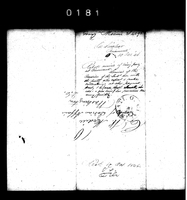 Letter from Joseph Sinclear to William Medill, October 12 1846
Letter from Joseph Sinclear to William Medill, October 12 1846 This is just the summary of a letter. Sinclear reports that creditors are traveling with the Miamis in hopes of receiving payments at an annuity payment in Kansas.
-
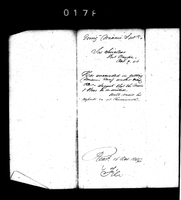 Letter from Joseph Sinclear to William Medill, October 7 1846
Letter from Joseph Sinclear to William Medill, October 7 1846 The Miami people are on their way to their new “country” on the Osage River. With the military present their has been no acts of violence between the Indians. Once the Miamis arrive at their new land, they will be reunited with the Weas.
-
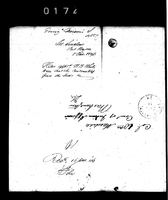 Letter from Joseph Sinclear to Willian Medill, October 8 1846
Letter from Joseph Sinclear to Willian Medill, October 8 1846 Sinclear has appointed William B. White as an assistant to oversee that the Indians are being properly fed and treated.
-
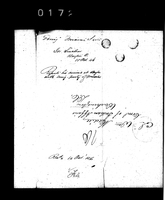 Letter from Joseph Sinclear to William Medill, October 10 1846
Letter from Joseph Sinclear to William Medill, October 10 1846 Sinclear is informing Indian Affairs that the emigrating party of Indians have reached their destination safely. Although some are sick they are being treated and improving in health.
-
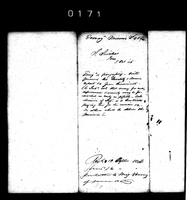 Letter from Joseph Sinclear to William Medill, October 5 1846
Letter from Joseph Sinclear to William Medill, October 5 1846 Sinclear has received news that Ewing (one of the removal contract owners) will protest paying Sinclear's salary except for the dates of the actual migration, rather than the full term of his work in preparation. Sinclear also asks who will receive the Miamis in the West.
-
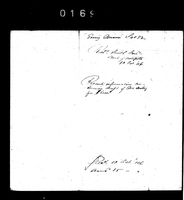 Letter of Richard Smith to William Medill[?], October 13 1846
Letter of Richard Smith to William Medill[?], October 13 1846 Smith, representing the Bank of the Metropolis, wants to know if Thomas Dowling has drawn $6000.
-
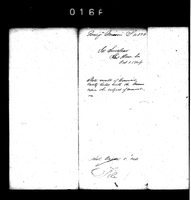 Letter from Joseph Sinclear to William Medill, October 1 1846
Letter from Joseph Sinclear to William Medill, October 1 1846 Sinclear is updating Medill on progress. Families have not yet arrived at the emigration camp, and they have prepared for a local mounted militia to help if necessary.
-
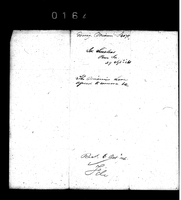 Letter from Joseph Sinclear to William Medill, September 29 1846
Letter from Joseph Sinclear to William Medill, September 29 1846 Sinclear is assembling folks to migrate, and thanks the Department for sending military help.
-
 Letter from Joseph Sinclair to William Medill, September 23 1846
Letter from Joseph Sinclair to William Medill, September 23 1846 Joseph Sinclair is notifying Wiliam Medill that he recieved his previous letter regarding the presidents orders which were to send a force of troops to come and remove the miamias. In anticipation of this Joseph called a council with local chiefs and did his best to convince them that it was in their best interests to 'remove'. Also, he notified Medill that he appointed a physician to take care of individuals as they removed.
-
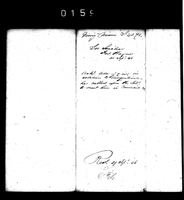 Letter from Joseph Sinclair to William Medill, September 21 1846
Letter from Joseph Sinclair to William Medill, September 21 1846 Joseph Sinclair notifying Medill that he called a council of local chiefs to meet him at the fork of the Wabash River. There he will ensure that the Miamis remove themselves from thier lands.
-
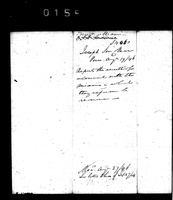 Letter from Joseph Sinclear to William Medill, August 19 1846
Letter from Joseph Sinclear to William Medill, August 19 1846 Sinclear reports on a council with the Miami leaders. He threatens them that they must say whether they will migrate or not. They respond that they do not need their annuities because they have plenty of corn growing.
-
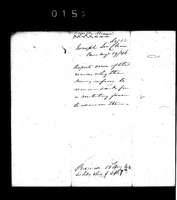 Joseph Sinclear to William Medill, August 19 1846
Joseph Sinclear to William Medill, August 19 1846 Sinclear requests a military force to make the Miamis migrate.
-
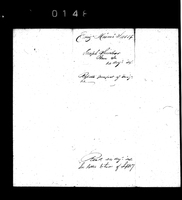 Letter from Joseph Sinclear to William Medill, August 1 1846
Letter from Joseph Sinclear to William Medill, August 1 1846 Sinclear feels that Lafontain is working with traders to delay removal. Sinclear thinks that Lafontain may be deposed. Sinclear is also unhappy with Dr. Fitch who is working to oppose removal.
-
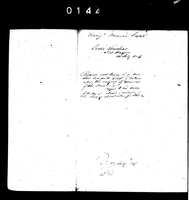 Letter from Joseph Sinclear to William Medill, July 20 1846
Letter from Joseph Sinclear to William Medill, July 20 1846 Sinclear reports that he told the Miami chief that the government would withhold annuities if the tribe did not migrate, and that it would not be Sinclear's fault but the chief's fault for the suffering of his people in that event. Lafontaine is waiting to get word from Graham Fitch.
-
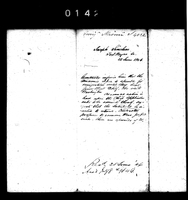 Letter from Joseph Sinclear to William Medill, June 22 1846
Letter from Joseph Sinclear to William Medill, June 22 1846 According to Coquillard, the Miamis are waiting for Chief Lafontaine with visit Washington and return with information. They will not go to Coquillard before getting information from their chief. Coquillard will remove remnant Weas.
-
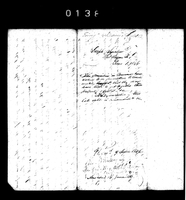 Letter from Joseph Sinclear to William Medill, June 1 1846
Letter from Joseph Sinclear to William Medill, June 1 1846 The Miamis want to remain until August. Sinclear urges the Indian Department not to pay the Miamis their annuities until they are in Kansas.
-
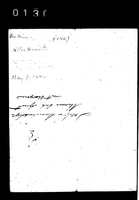 List of Slocum, Richardville, and Meshingomesia families, May 9 1846
List of Slocum, Richardville, and Meshingomesia families, May 9 1846 Contains indication of a discussion on how flour and pork annuities should be distrubuted to Miamis staying in Indiana versus being moved West of the Mississippi. The later part of the document also shows the families permitted to stay in Indiana through resolutions with a list of their names and ages. Families listed include the Slocums, the Richardvilles, and the family of "Me shing go me sea"
-
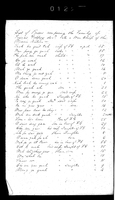 List of Godfroy family and the removal list, May 25 1846
List of Godfroy family and the removal list, May 25 1846
-
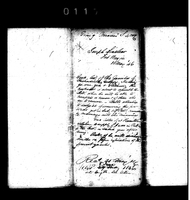 Letter from Joseph Sinclear to William Medill, May 11 1846
Letter from Joseph Sinclear to William Medill, May 11 1846
-
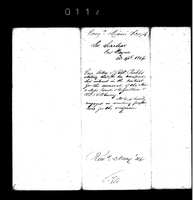 Letter and enclosure from Joseph Sinclear to William Medill, April 23 1846
Letter and enclosure from Joseph Sinclear to William Medill, April 23 1846 Joseph Sinclear informs Indian Affairs of the transfer of the removal contract from Robert Peebles to Coquillard and Ewing. Sinclear lays out Coquillard's plans to assemble the Indians together for an examination into their debts, and celebrates the prospect of effecting emigration within the season. In his enclosure, Peebles details his transfer of the removal contract to Coquillard and Ewing, stating that he believes these men to be competent and capable of successfully carrying out the emigration in accordance with the directives of the Department of Indian Affairs.
-
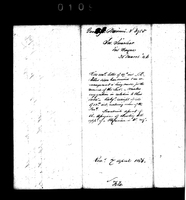 Letter and enclosure from Joseph Sinclear to William Medill, March 30 1846
Letter and enclosure from Joseph Sinclear to William Medill, March 30 1846 Joseph Sinclear informs Indian Affairs of the last remainging obstacles to emigration. Sinclear views the indebtedness of the tribe as the most serious obstacle to securing removal, and he discusses at length the importance of resolving the debts of individual tribe members with their creditors. Sinclear also details the appointment of a physician to accompany the tribe on their emigration, an appointment which is documented in greater depth in Peebles's enclosure. He even makes reference to lists of Miamis who are to remain in Indiana and those who are to emigrate and touches upon the logistics behind assembling emigrating members of the tribe together for purposes of conducting investigations into their debts.
 Letter from Hugh McCulloch to William Medill, November 23 1847 Now that the removal contract has been fulfilled, McCulloch asks the department to remit the payment to the bank in Fort Wayne as quickly as possible.
Letter from Hugh McCulloch to William Medill, November 23 1847 Now that the removal contract has been fulfilled, McCulloch asks the department to remit the payment to the bank in Fort Wayne as quickly as possible. Letter from E. W. McGaughey to William Medill, February 20 1847 McGaughey is in the House of Representatives, writing on behalf of former contract owner Dowling, supporting Dowling in an apparent disagreement with the next owner of the contract, Peebles, regarding a $6000 draft.
Letter from E. W. McGaughey to William Medill, February 20 1847 McGaughey is in the House of Representatives, writing on behalf of former contract owner Dowling, supporting Dowling in an apparent disagreement with the next owner of the contract, Peebles, regarding a $6000 draft. Letter from Hugh McCulloch to William Medill, January 7 1847 McCulloch represents the Bank of Indiana. He asks that the Indian Department pay the contractors more than the $35,000 that the Department plans to pay them. The contractors still need to re-pay $15,000 to Peebles and the year-long subsistence rations to the Miamis in Kansas.
Letter from Hugh McCulloch to William Medill, January 7 1847 McCulloch represents the Bank of Indiana. He asks that the Indian Department pay the contractors more than the $35,000 that the Department plans to pay them. The contractors still need to re-pay $15,000 to Peebles and the year-long subsistence rations to the Miamis in Kansas. Letter and enclosure from Alfred J. Vaughan to William Medill, June 30 1847 Alfred Vaughan requests payment for his son Leonidas as the commissary who issued rations to Miamis in spring 1847. Included is the list of Miami families.
Letter and enclosure from Alfred J. Vaughan to William Medill, June 30 1847 Alfred Vaughan requests payment for his son Leonidas as the commissary who issued rations to Miamis in spring 1847. Included is the list of Miami families. Letter and enclosure from Thomas Harvey to Willam Medill, July 8 1847 Harvey encloses a list of Myaamia heads of families provided by sub-agent Vaughan. Vaughan's list includes how many men, women, and children were in each Miami family.
Letter and enclosure from Thomas Harvey to Willam Medill, July 8 1847 Harvey encloses a list of Myaamia heads of families provided by sub-agent Vaughan. Vaughan's list includes how many men, women, and children were in each Miami family. Letter from Samuel Hannah and Hugh McCulloch to William Medill, January 25 1847 Hannah and McCulloch ask for the money meant for them as the attorneys and beneficiaries of Coquillard, Edsall and Ewing.
Letter from Samuel Hannah and Hugh McCulloch to William Medill, January 25 1847 Hannah and McCulloch ask for the money meant for them as the attorneys and beneficiaries of Coquillard, Edsall and Ewing. Letter from Samuel Edsall to William Medill, August 9 1847
Letter from Samuel Edsall to William Medill, August 9 1847  OIA-418-Object-90
OIA-418-Object-90  Letter from W.G. Ewing to William Medill, August 8 1847 Ewing mentions that Major Jouett wrote a letter to Medill that no Miamis were permitted to remain behind during the removal in order to gather their crops.
Letter from W.G. Ewing to William Medill, August 8 1847 Ewing mentions that Major Jouett wrote a letter to Medill that no Miamis were permitted to remain behind during the removal in order to gather their crops. Letter from W.G. Ewing to William Medill, May 19 1847 Ewing accuses Sinclear of working for a group of "new claimants" who apparently have claims on Miami debts. While employed as sub-contractor of removal, Sinclear apparently went to Washington to get those claims approved, and was promised a cut. Ewing goes on the argue that payments must be organized so that his firm can receive debts owed to them. He complains that the Indian trade business is not very profitable.
Letter from W.G. Ewing to William Medill, May 19 1847 Ewing accuses Sinclear of working for a group of "new claimants" who apparently have claims on Miami debts. While employed as sub-contractor of removal, Sinclear apparently went to Washington to get those claims approved, and was promised a cut. Ewing goes on the argue that payments must be organized so that his firm can receive debts owed to them. He complains that the Indian trade business is not very profitable. W.G. Ewing to William Medill, May 12 1847 Coquillard has returned following the 1846 removal; he is ready to remove those who did dnot go on the first emigration. Coquillard's wife will go in support. Those who need to be removed are the families of Koassee, White Loon, Me-se-quah, and Revarre.
W.G. Ewing to William Medill, May 12 1847 Coquillard has returned following the 1846 removal; he is ready to remove those who did dnot go on the first emigration. Coquillard's wife will go in support. Those who need to be removed are the families of Koassee, White Loon, Me-se-quah, and Revarre. Letter and enclosures from W.G. Ewing to William Medill, April 26 1847 Ewing seeks to defend himself and fellow contractors. In particular, he asserts that the contractors did not allow any Miamis to remain in Indiana except those permitted by treaty and that they did due diligence to find all who must migrate. He includes several affidavits to that effect.
Letter and enclosures from W.G. Ewing to William Medill, April 26 1847 Ewing seeks to defend himself and fellow contractors. In particular, he asserts that the contractors did not allow any Miamis to remain in Indiana except those permitted by treaty and that they did due diligence to find all who must migrate. He includes several affidavits to that effect. Letter from W.G. Ewing to William Medill, March 13 1847 Ewing is asserting that he did all he could to fulfill the contract. The context appears to be that they did not deport all Miamis, particularly those who may be Weas or intermarried among Potawatomis on the upper Tippecanoe River.
Letter from W.G. Ewing to William Medill, March 13 1847 Ewing is asserting that he did all he could to fulfill the contract. The context appears to be that they did not deport all Miamis, particularly those who may be Weas or intermarried among Potawatomis on the upper Tippecanoe River. OIA-418-Object-84
OIA-418-Object-84  W.G. and G.W. Ewing to William Medill, February 22 1847 Suggesting and promoting (by his request) Alexis Coquillard as contract agent to remove Potawatomi, Ottawa, and Ojibwe from Indiana per the 1833 Chicago Treaty, and offering to support him.financially. In a N.B. they
W.G. and G.W. Ewing to William Medill, February 22 1847 Suggesting and promoting (by his request) Alexis Coquillard as contract agent to remove Potawatomi, Ottawa, and Ojibwe from Indiana per the 1833 Chicago Treaty, and offering to support him.financially. In a N.B. they W.G. Ewing to the War Department, February 17 1847 Submits certified copies of receipts that Ewing argues should be deducted from Sinclear's salary.
W.G. Ewing to the War Department, February 17 1847 Submits certified copies of receipts that Ewing argues should be deducted from Sinclear's salary. Letter of Alexis Coquillard and Samuel Edsall to William Medill?, n.d. Summarizing that they removed 328 Miamis in 1846 and another group in 1847, thus completing their contract including feeding them for a year in Kansas.
Letter of Alexis Coquillard and Samuel Edsall to William Medill?, n.d. Summarizing that they removed 328 Miamis in 1846 and another group in 1847, thus completing their contract including feeding them for a year in Kansas. Letter of Alexis Coquillard and Samuel Edsall to William Medill, December 30 1847 The two contractors lay out an apparent scheme by Osage sub-agent Vaughan to fleece them by employing Vaughan's son and issuing too many rations, thus forcing the contractors to pay his son for the work.
Letter of Alexis Coquillard and Samuel Edsall to William Medill, December 30 1847 The two contractors lay out an apparent scheme by Osage sub-agent Vaughan to fleece them by employing Vaughan's son and issuing too many rations, thus forcing the contractors to pay his son for the work. Letter packet re: Alexis Coquillard, June 25 1847 Coquillard offers to remove Potawatomis associated with Miamis for more than the suggested $25/person; he is the cheapest removal contractor he knows of. Miamis are returning from the West under, he thinks, the help of traders Bartlett, Avaline, and Miller. Included in this packet is a scathing letter from a person named Driver accusing Coquillard of spreading a rumor that he brought Miamis back from Kansas to Indiana, and a letter from the Indian Department sticking to its offer of $25/ Potawatomi person removed.
Letter packet re: Alexis Coquillard, June 25 1847 Coquillard offers to remove Potawatomis associated with Miamis for more than the suggested $25/person; he is the cheapest removal contractor he knows of. Miamis are returning from the West under, he thinks, the help of traders Bartlett, Avaline, and Miller. Included in this packet is a scathing letter from a person named Driver accusing Coquillard of spreading a rumor that he brought Miamis back from Kansas to Indiana, and a letter from the Indian Department sticking to its offer of $25/ Potawatomi person removed. Letter from Alexis Coquillard to William Medill?, May 18 1847 Coquillard says that the 30 or so "Indians" who remained to harvest corn, but were supposed to migrate, were not authorized to remain in Indiana. He offers to migrate families who are Miami-Potawatomi for a fee. He suggests the proper time Sinclear was acting as emigration superintendent, weighing in on the dispute regarding Sinclear's salary.
Letter from Alexis Coquillard to William Medill?, May 18 1847 Coquillard says that the 30 or so "Indians" who remained to harvest corn, but were supposed to migrate, were not authorized to remain in Indiana. He offers to migrate families who are Miami-Potawatomi for a fee. He suggests the proper time Sinclear was acting as emigration superintendent, weighing in on the dispute regarding Sinclear's salary. Letter and enclosure from Richard Chute to Charles Cathcart, February 23 1847 Allen Hamilton suggests that if the government wants to remove all the Potawatomis from Indiana, that Alexis Coquillard would do it with kindness.
Letter and enclosure from Richard Chute to Charles Cathcart, February 23 1847 Allen Hamilton suggests that if the government wants to remove all the Potawatomis from Indiana, that Alexis Coquillard would do it with kindness. Correspondence re: selecting and paying a physician, undated 1846 Notes responding to Sinclear's letter of February 1846 regarding the physician, suggesting that Sinclear should ask the Miamis to help him select a physician. Includes quotes from the contract relating to payment of the superintendent.
Correspondence re: selecting and paying a physician, undated 1846 Notes responding to Sinclear's letter of February 1846 regarding the physician, suggesting that Sinclear should ask the Miamis to help him select a physician. Includes quotes from the contract relating to payment of the superintendent. Letter from Joseph Sinclear to William Medill, December 1 1846 Sinclear has money for steel and iron and wants to return it. The contractors refuse to pay him expenses on the removal. Sinclear has paid George Hunt, interpreter.
Letter from Joseph Sinclear to William Medill, December 1 1846 Sinclear has money for steel and iron and wants to return it. The contractors refuse to pay him expenses on the removal. Sinclear has paid George Hunt, interpreter. Letter and enclosures from Joseph Sinclear to William Medill, November 11 1846 Sinclear forwards letters (certified) demonstrating that the ponies have arrived, that several ponies were weak and died or were sold, and that the contractors provided enough food for the Miamis en route.
Letter and enclosures from Joseph Sinclear to William Medill, November 11 1846 Sinclear forwards letters (certified) demonstrating that the ponies have arrived, that several ponies were weak and died or were sold, and that the contractors provided enough food for the Miamis en route. Letter from Joseph Sinclear to William Medill, November 5 1846 Reports that the Miamis are arriving on ponies on the reservation. A boy died, bringing total deaths to seven.
Letter from Joseph Sinclear to William Medill, November 5 1846 Reports that the Miamis are arriving on ponies on the reservation. A boy died, bringing total deaths to seven. Letter from Joseph Sinclear to William Medill, November 1 1846 From Kanzas Landing, Mo. He is recording his receipt of various letters and preparing to turn over the Miamis to Agent Vaughan.
Letter from Joseph Sinclear to William Medill, November 1 1846 From Kanzas Landing, Mo. He is recording his receipt of various letters and preparing to turn over the Miamis to Agent Vaughan. Letter of Joseph Sinclear to William Medill, October 21 1846 The group has arrived at St. Louis. He reports the death of two Miamis.
Letter of Joseph Sinclear to William Medill, October 21 1846 The group has arrived at St. Louis. He reports the death of two Miamis. Letter from Joseph Sinclear to William Medill, October 14 1846 Sinclear encloses a list of Miamis on board the Steamer Colorado. Ezekiel French has been hired to capture fugitives, who may move West with Potawatomis. Sinclear and Jouett also say they promised to attempt to help creditors get annuity money in Kansas.
Letter from Joseph Sinclear to William Medill, October 14 1846 Sinclear encloses a list of Miamis on board the Steamer Colorado. Ezekiel French has been hired to capture fugitives, who may move West with Potawatomis. Sinclear and Jouett also say they promised to attempt to help creditors get annuity money in Kansas. Letter from Richard Smith to William Medill, October 19 1846 The board of the Bank of the Metropolis wants assurance that it will be paid $6000 once the Miamis arrive in Kansas.
Letter from Richard Smith to William Medill, October 19 1846 The board of the Bank of the Metropolis wants assurance that it will be paid $6000 once the Miamis arrive in Kansas. Letter from Joseph Sinclear to William Medill, October 12 1846 This is just the summary of a letter. Sinclear reports that creditors are traveling with the Miamis in hopes of receiving payments at an annuity payment in Kansas.
Letter from Joseph Sinclear to William Medill, October 12 1846 This is just the summary of a letter. Sinclear reports that creditors are traveling with the Miamis in hopes of receiving payments at an annuity payment in Kansas. Letter from Joseph Sinclear to William Medill, October 7 1846 The Miami people are on their way to their new “country” on the Osage River. With the military present their has been no acts of violence between the Indians. Once the Miamis arrive at their new land, they will be reunited with the Weas.
Letter from Joseph Sinclear to William Medill, October 7 1846 The Miami people are on their way to their new “country” on the Osage River. With the military present their has been no acts of violence between the Indians. Once the Miamis arrive at their new land, they will be reunited with the Weas. Letter from Joseph Sinclear to Willian Medill, October 8 1846 Sinclear has appointed William B. White as an assistant to oversee that the Indians are being properly fed and treated.
Letter from Joseph Sinclear to Willian Medill, October 8 1846 Sinclear has appointed William B. White as an assistant to oversee that the Indians are being properly fed and treated. Letter from Joseph Sinclear to William Medill, October 10 1846 Sinclear is informing Indian Affairs that the emigrating party of Indians have reached their destination safely. Although some are sick they are being treated and improving in health.
Letter from Joseph Sinclear to William Medill, October 10 1846 Sinclear is informing Indian Affairs that the emigrating party of Indians have reached their destination safely. Although some are sick they are being treated and improving in health. Letter from Joseph Sinclear to William Medill, October 5 1846 Sinclear has received news that Ewing (one of the removal contract owners) will protest paying Sinclear's salary except for the dates of the actual migration, rather than the full term of his work in preparation. Sinclear also asks who will receive the Miamis in the West.
Letter from Joseph Sinclear to William Medill, October 5 1846 Sinclear has received news that Ewing (one of the removal contract owners) will protest paying Sinclear's salary except for the dates of the actual migration, rather than the full term of his work in preparation. Sinclear also asks who will receive the Miamis in the West. Letter of Richard Smith to William Medill[?], October 13 1846 Smith, representing the Bank of the Metropolis, wants to know if Thomas Dowling has drawn $6000.
Letter of Richard Smith to William Medill[?], October 13 1846 Smith, representing the Bank of the Metropolis, wants to know if Thomas Dowling has drawn $6000. Letter from Joseph Sinclear to William Medill, October 1 1846 Sinclear is updating Medill on progress. Families have not yet arrived at the emigration camp, and they have prepared for a local mounted militia to help if necessary.
Letter from Joseph Sinclear to William Medill, October 1 1846 Sinclear is updating Medill on progress. Families have not yet arrived at the emigration camp, and they have prepared for a local mounted militia to help if necessary. Letter from Joseph Sinclear to William Medill, September 29 1846 Sinclear is assembling folks to migrate, and thanks the Department for sending military help.
Letter from Joseph Sinclear to William Medill, September 29 1846 Sinclear is assembling folks to migrate, and thanks the Department for sending military help. Letter from Joseph Sinclair to William Medill, September 23 1846 Joseph Sinclair is notifying Wiliam Medill that he recieved his previous letter regarding the presidents orders which were to send a force of troops to come and remove the miamias. In anticipation of this Joseph called a council with local chiefs and did his best to convince them that it was in their best interests to 'remove'. Also, he notified Medill that he appointed a physician to take care of individuals as they removed.
Letter from Joseph Sinclair to William Medill, September 23 1846 Joseph Sinclair is notifying Wiliam Medill that he recieved his previous letter regarding the presidents orders which were to send a force of troops to come and remove the miamias. In anticipation of this Joseph called a council with local chiefs and did his best to convince them that it was in their best interests to 'remove'. Also, he notified Medill that he appointed a physician to take care of individuals as they removed. Letter from Joseph Sinclair to William Medill, September 21 1846 Joseph Sinclair notifying Medill that he called a council of local chiefs to meet him at the fork of the Wabash River. There he will ensure that the Miamis remove themselves from thier lands.
Letter from Joseph Sinclair to William Medill, September 21 1846 Joseph Sinclair notifying Medill that he called a council of local chiefs to meet him at the fork of the Wabash River. There he will ensure that the Miamis remove themselves from thier lands. Letter from Joseph Sinclear to William Medill, August 19 1846 Sinclear reports on a council with the Miami leaders. He threatens them that they must say whether they will migrate or not. They respond that they do not need their annuities because they have plenty of corn growing.
Letter from Joseph Sinclear to William Medill, August 19 1846 Sinclear reports on a council with the Miami leaders. He threatens them that they must say whether they will migrate or not. They respond that they do not need their annuities because they have plenty of corn growing. Joseph Sinclear to William Medill, August 19 1846 Sinclear requests a military force to make the Miamis migrate.
Joseph Sinclear to William Medill, August 19 1846 Sinclear requests a military force to make the Miamis migrate. Letter from Joseph Sinclear to William Medill, August 1 1846 Sinclear feels that Lafontain is working with traders to delay removal. Sinclear thinks that Lafontain may be deposed. Sinclear is also unhappy with Dr. Fitch who is working to oppose removal.
Letter from Joseph Sinclear to William Medill, August 1 1846 Sinclear feels that Lafontain is working with traders to delay removal. Sinclear thinks that Lafontain may be deposed. Sinclear is also unhappy with Dr. Fitch who is working to oppose removal. Letter from Joseph Sinclear to William Medill, July 20 1846 Sinclear reports that he told the Miami chief that the government would withhold annuities if the tribe did not migrate, and that it would not be Sinclear's fault but the chief's fault for the suffering of his people in that event. Lafontaine is waiting to get word from Graham Fitch.
Letter from Joseph Sinclear to William Medill, July 20 1846 Sinclear reports that he told the Miami chief that the government would withhold annuities if the tribe did not migrate, and that it would not be Sinclear's fault but the chief's fault for the suffering of his people in that event. Lafontaine is waiting to get word from Graham Fitch. Letter from Joseph Sinclear to William Medill, June 22 1846 According to Coquillard, the Miamis are waiting for Chief Lafontaine with visit Washington and return with information. They will not go to Coquillard before getting information from their chief. Coquillard will remove remnant Weas.
Letter from Joseph Sinclear to William Medill, June 22 1846 According to Coquillard, the Miamis are waiting for Chief Lafontaine with visit Washington and return with information. They will not go to Coquillard before getting information from their chief. Coquillard will remove remnant Weas. Letter from Joseph Sinclear to William Medill, June 1 1846 The Miamis want to remain until August. Sinclear urges the Indian Department not to pay the Miamis their annuities until they are in Kansas.
Letter from Joseph Sinclear to William Medill, June 1 1846 The Miamis want to remain until August. Sinclear urges the Indian Department not to pay the Miamis their annuities until they are in Kansas. List of Slocum, Richardville, and Meshingomesia families, May 9 1846 Contains indication of a discussion on how flour and pork annuities should be distrubuted to Miamis staying in Indiana versus being moved West of the Mississippi. The later part of the document also shows the families permitted to stay in Indiana through resolutions with a list of their names and ages. Families listed include the Slocums, the Richardvilles, and the family of "Me shing go me sea"
List of Slocum, Richardville, and Meshingomesia families, May 9 1846 Contains indication of a discussion on how flour and pork annuities should be distrubuted to Miamis staying in Indiana versus being moved West of the Mississippi. The later part of the document also shows the families permitted to stay in Indiana through resolutions with a list of their names and ages. Families listed include the Slocums, the Richardvilles, and the family of "Me shing go me sea" List of Godfroy family and the removal list, May 25 1846
List of Godfroy family and the removal list, May 25 1846  Letter from Joseph Sinclear to William Medill, May 11 1846
Letter from Joseph Sinclear to William Medill, May 11 1846  Letter and enclosure from Joseph Sinclear to William Medill, April 23 1846 Joseph Sinclear informs Indian Affairs of the transfer of the removal contract from Robert Peebles to Coquillard and Ewing. Sinclear lays out Coquillard's plans to assemble the Indians together for an examination into their debts, and celebrates the prospect of effecting emigration within the season. In his enclosure, Peebles details his transfer of the removal contract to Coquillard and Ewing, stating that he believes these men to be competent and capable of successfully carrying out the emigration in accordance with the directives of the Department of Indian Affairs.
Letter and enclosure from Joseph Sinclear to William Medill, April 23 1846 Joseph Sinclear informs Indian Affairs of the transfer of the removal contract from Robert Peebles to Coquillard and Ewing. Sinclear lays out Coquillard's plans to assemble the Indians together for an examination into their debts, and celebrates the prospect of effecting emigration within the season. In his enclosure, Peebles details his transfer of the removal contract to Coquillard and Ewing, stating that he believes these men to be competent and capable of successfully carrying out the emigration in accordance with the directives of the Department of Indian Affairs. Letter and enclosure from Joseph Sinclear to William Medill, March 30 1846 Joseph Sinclear informs Indian Affairs of the last remainging obstacles to emigration. Sinclear views the indebtedness of the tribe as the most serious obstacle to securing removal, and he discusses at length the importance of resolving the debts of individual tribe members with their creditors. Sinclear also details the appointment of a physician to accompany the tribe on their emigration, an appointment which is documented in greater depth in Peebles's enclosure. He even makes reference to lists of Miamis who are to remain in Indiana and those who are to emigrate and touches upon the logistics behind assembling emigrating members of the tribe together for purposes of conducting investigations into their debts.
Letter and enclosure from Joseph Sinclear to William Medill, March 30 1846 Joseph Sinclear informs Indian Affairs of the last remainging obstacles to emigration. Sinclear views the indebtedness of the tribe as the most serious obstacle to securing removal, and he discusses at length the importance of resolving the debts of individual tribe members with their creditors. Sinclear also details the appointment of a physician to accompany the tribe on their emigration, an appointment which is documented in greater depth in Peebles's enclosure. He even makes reference to lists of Miamis who are to remain in Indiana and those who are to emigrate and touches upon the logistics behind assembling emigrating members of the tribe together for purposes of conducting investigations into their debts.